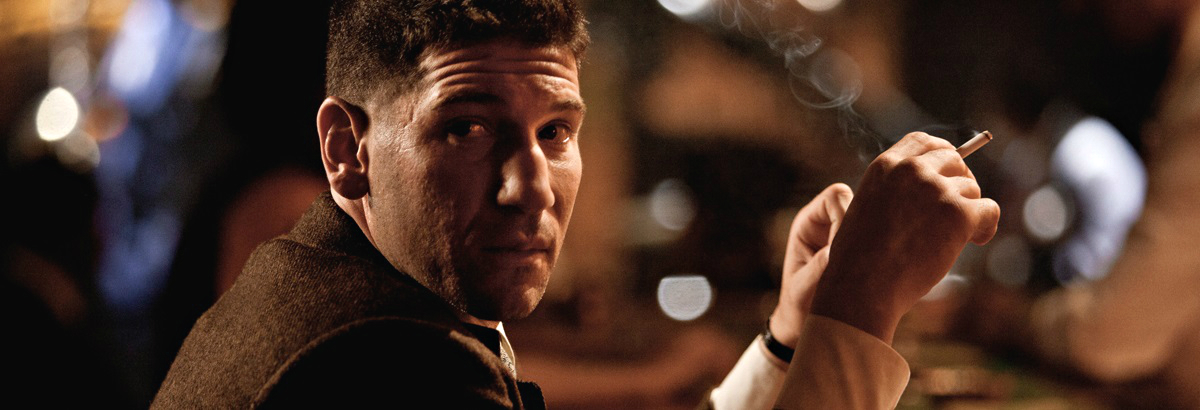Frank Darabont, the man behind such acclaimed hits as ‘The Shawshank Redemption‘ and ‘The Green Mile‘, as well as the former show-runner of ‘The Walking Dead‘, returns to television this week with ‘Mob City’, a limited run six-episode production that premiered Wednesday night on TNT. (“Limited” in this case only means that ratings will determine if the show comes back next year).
Darabont’s new series is based on the book ‘L.A. Noir’ by John Buntin, which tells the real-life story of gangsters Ben “Bugsy” Siegel and Mickey Cohen, and of Los Angeles police chief William Parker, the straight-laced law enforcement officer who tried to bring them down. Darabont takes these historical figures and weaves his own fictional characters into their story, first and foremost an L.A. detective and former Marine gunnery sergeant named Joe Teague (Jon Bernthal, a.k.a. Shane from ‘The Walking Dead’).
In the pilot episode (set in 1947, although several flashbacks take us into the 1920s), Teague gets a mysterious note telling him to go to a local bar at as certain time. When he gets there, he’s approached by local comedian Hecky Nash (Simon Pegg). Nash tells Teague that he comes highly recommended and asks him to accompany him on an exchange that Nash has set up with a few very dangerous men. Nash doesn’t give Teague many details, but he believes that the people he’s meeting will be less likely to get violent if he brings a cop along with him.
Teague eventually agrees to join Nash, but also works with his colleagues back at the police station to try to find out what Nash’s exchange might be all about. The two men set the meeting in an oil field overlooking Los Angeles, as gangster Sid Rothman (Robert Knepper from ‘Prison Break’) arrives with one of his men. As it turns out, Nash has some (incriminating?) photos of Bugsy Siegel to turn over to Rothman in exchange for $50,000. The exchange goes off without a hitch, and Rothman leaves. However, while Nash is celebrating his new-found riches, Teague pulls out a gun and shoots him down. We’ll discover why in the second episode (the second half of this week’s two-hour premiere).
As it turns out, Teague has some kind of connection with Nash’s girlfriend, Jasmine Fontaine (Alexa Davalos from Darabont’s ‘The Mist’) – but the big reveal is saved for the end of the second hour. First, the pilot episode wraps up with Teague meeting lawyer and right-hand man to Siegel, Ned Stax (Milo Ventimiglia, ‘Heroes’), who was a fellow Marine with Teague in World War II and who pointed Nash in Teague’s direction. Teague has taken Nash’s $50,000 and wants to return it to Siegel. Stax insists that Bugsy wants Teague to keep the money, but Teague refuses. He doesn’t want the mobster to think he’s bought himself a police officer.
The second episode opens with flashbacks that give us some nice insight into the character of police chief Parker (Neal McDonough). We learn that he witnessed a theater hold-up (with child-versions of the series’ main gangsters) that motivated him to get into law enforcement. Then, a few years later, we see him single-handedly defuse a hostage situation which all his fellow officers assume is a suicide mission.
Jumping back to 1947, Stax meets with Siegel (Edward Burns), Rothman and Mickey Cohen (Jeremy Luke) in a posh nightclub owned by Cohen, where Siegel is none-too-happy that Teague has refused to keep the $50,000. The mobsters want to know why Teague would kill Nash if not for the money.
Meanwhile, Jasmine – who was packed and ready to leave town when Nash returned from his exchange – has been called into the police station for questioning. The cops want to know what Nash was trading for the money, but Teague suspects that Jasmine is in far deeper than she lets on. The second episode focuses strongly on Jasmine, who works as the photo girl in Mickey Cohen’s nightclub. We see her returning to her home late in the episode and destroying/trashing a number of photos she has taken. At this point, we aren’t sure why. However, we do learn Teague’s big connection to her as the premiere wraps up – it turns out that Jasmine is his ex-wife.
‘Mob City’ (which was formerly called both ‘L.A. Noir’ and ‘Lost Angeles’ before TNT settled on the more generic, if audience-friendly title) was one of my most highly-anticipated new series of this year, and I’d be lying to you if I didn’t say that it’s somewhat of a letdown. While I’d hoped for a TV version of ‘L.A. Confidential‘, the series compares more directly to (other than the fact that they’re set in different eras, aside from the flashback sequences) HBO’s ‘Boardwalk Empire‘ – and ‘Mob City’ doesn’t measure up to that… at least, not so far.
Although Darabont has loaded up his drama with some of the best character actors he could find (many of them veterans of his own former productions), the show has a flatness to the line delivery that almost makes one believe that the actors involved aren’t quite sure if Darabont wants to make a serious drama about 1940s Los Angeles, or a movie version of it. (It doesn’t help that every line of dialogue is written like a Raymond Chandler novel, either. A little is fun, a lot – as we get here – is borderline corny.)
Another problem is that ‘Mob City’ looks and feels very much like a network TV show rather than the cinematic look we often get with cable series. Even with its TV-MA rating, there’s little here than couldn’t be aired on CBS, ABC or NBC. While the sets and costume design are outstanding, most of the sets look like, well sets. Even the on-location exteriors seem a bit too pristine. In other words, ‘Mob City’ lacks the grittiness and realism one would expect from a series like this. In doing a show about the 1940s, Darabont is shooting his episodes much in the way a movie made in the 1940s might look, and I think that hurts the series.
Still, there are some good points here. The actors, despite some of the dialogue they’re required to deliver, are solid – particularly Robert Knepper’s Rothman, who could become the breakout star of ‘Mob City’ if it proves to be a ratings success. Bernthal’s Teague isn’t quite as interesting or multi-dimensional as his character on ‘The Walking Dead’, but hopefully we’ll see more interesting stuff as the next four episodes unfold.
So, I’m on the fence about the series right now. Given its limited run, I’m planning to watch until the conclusion a few weeks from now anyway. It’s a show with a lot of promise, but so far, ‘Mob City’ hasn’t delivered what I hoped from it.





Josh Zyber
I think you’re a little too hard on this. I enjoyed it a lot, though I can acknowledge many of your points here. The show has a layer of artifice, and is more about gangster movies than actual history. It hits just about every single film noir cliche, and pretty much every shot is composed to be an iconic image.
I think Boardwalk Empire (what I’ve seen of it) strives to be something deeper and more complex, while this is just an homage to old gangster flicks. The show is more like De Palma’s The Untouchables (and maybe a little bit of Warren Beatty’s Dick Tracy) than L.A. Confidential.
Once I got the sense of that, I wasn’t bothered by it. Bernthal makes a fine film noir antihero (and I enjoyed seeing Shane and Dale on screen together again!). Simon Pegg was great, and pulled off that accent he was doing. The plotting and dialogue may be a little simplistic (which isn’t necessarily inappropriate), but the thematic morality is suitably murky.
I was going to argue against your comment about this looking like it could air on a regular broadcast network. It’s incredibly violent. But then I remembered that NBC airs shows like Hannibal and Dracula, so I’ll just concede that point.
Shannon Nutt
Well, if it’s indeed supposed to be just a homage to gangster films, then the look/feel is probably right – I just was expecting something a little more realistic and believable. I find it hard to believe a significant audience will invest long-term in a series based solely on its tone. Viewers need to care about the characters, and other than Robert Knepper, these characterizations are pretty uninteresting.
Again, it’s still early – I didn’t think much of BOARDWALK EMPIRE the first season, either – and that show has grown into something very satisfying.
Jonathan Doan
I enjoyed it, but agree with Mr. Nutt, that it needs more heart and soul. It’s a tad flat.
On a side note, I love the old cliche that says a person with a loaded Tommy gun can shoot full on for about 5 minutes. Even a fully loaded 50 round drum magazine takes only a few seconds to empty.
Still, it’s a fun show and fun to take in all the era-specific details.
Josh Zyber
That tommy gun scene was so ridiculously prolonged that I have to think it was done intentionally for comedic effect. The show seems to exist in a hyper-real exaggerated vision of the time period, as filtered through old gangster movies, comic strips and pulp novels.
Jonathan Doan
Well, even the best, most realistic movies have to add a bit of flair and drama to the proceedings. Otherwise, it would just be dull. Plus, it keeps Mythbusters on the air.